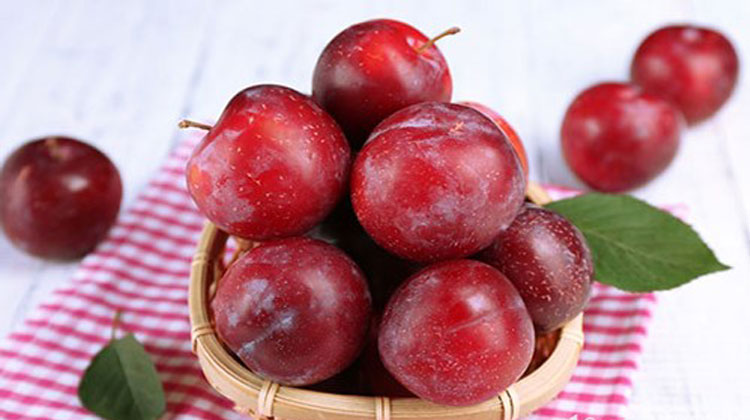
Plums are rich in essential vitamins and minerals.They are an excellent source of Iron, Vitamin C and have antioxidant properties.
I love to snack on some plumbs when they’re in season as they taste amazing and are good for your body. And, my furry friend likes to ‘beg’ for them! He always seems interested in what I’m eating.
But, are plums safe for our furry friends to munch on?
That’s precisely what I’ll be going through in this blog post!
In this blog post, I will answer the question, “Can Dogs Eat Plums?” in as much detail as I possibly can and share all there is to know.
So, without any further ado, let’s jump right in, shall we?
Perfect!
Yes or No: Can Dogs Eat Plums Without Problems?
According to the American Society for the Prevention of Cruelty to Animals, plums and other similar fruits such as peach, cherry, and apricot are toxic to dogs and should be kept as far away from them as possible.
In fact, the stems, leaves, as well as the seeds can cause your dog to have an aversive reaction.
Why Are Plums Unsafe for Dogs to Consume?
Now that you know that it is a good idea to keep plums as far away from your furry friend as possible, you should also understand why they are unsafe for your furry companion.
In this section of the blog, I’ll get into that.
Issues with the Pit
The main problem with your doggy friend having plums is the pit as it is sharp and can cause damage to your doggy friend’s esophagus, tummy, or intestines. In fact, the pit can even cause your furry friend to have internal bleeding!
Another risk with smaller dogs is that the pit can obstruct the doggy’s bowl and your furry friend might even need surgery.
Cyanide
The plum fruit and its seeds, stem, leave, etc. contain trace amounts of cyanide which is toxic to dogs and can even kill humans if given in large enough quantities.
While humans need large amounts, dogs are small in size and can easily be poisoned by the fruit.
The pit releases cyanide when it is crushed and can even cause your doggy friend to pass away if you don’t seek help immediately. The flesh of the fruit, however, is safe for your furry friend to consume.
Overripe, moldy, and fermented plum us not at all safe for your dog to consume. Seek help if your dog has even the smallest amount.
Other than that, your dog can have small quantities of the flesh of the fruit. However, we recommend that you keep your furry friend as far away from the fruit as possible.
After all, prevention is better than cure, right?
What To Do If Your Doggy Friend Ate Some Plums
Did your furry friend get his paws on some plums?
If so, it is best to give your vet a call and tell him what happened. Your dog is probably safe of he didn’t swallow the pit or crush it. Take away the remnants of the fruit from your dog as soon as you find his going to town on that fruit.
Your vet will guide you through what you’ll need to do so, don’t panic unless you absolutely have to.
Since it is the pit that is the problem, it is best to keep the fruit as far away from your doggy friend’s reach as you can.High counter, pet-proof drawers, and cabinets, or the refrigerators are some safe places.
If your dog has a sweet tooth, it is a good idea to buy some sweet treats that’ll satisfy your furry friend and keep him from sniffing around for something delicious to eat.
Consult your vet to determine which food is safe for your doggy to consume.
Moving on…
Clinical Signs and Symptoms You Should Look Out For
So, your dog ate some plumbs, but you’re pretty sure he’s in the safe zone. However, there are still a few things that you should look out for.
Call your vet or visit an emergency care center if you see any of the following symptoms:
- Brick red mucous membranes
- Dilated pupils
- Difficulty breathing
- Panting
- Shock
These are some serious signs of toxicity so, rush your dog to an emergency care center.
Final Words: Can Dogs Eat Plums?
No, dogs cannot eat plums.
While the flesh of the fruit in small quantities is safe for your furry friend to consume, the seed, stem, leaves, etc. contain a harmful toxin named cyanide which can cause seizures, illnesses, paralysis, and even death.
So, it is a good idea to keep your furry friend as far away from the fruit as possible.
Still, have any questions or concerns? Let me know in the comments, and I will get back to you as soon as I can!
Hello, everyone, my name is Paula Hughes. I am passionate about household pets including dogs and cats. So, I found it fit to create blog lovepetjournal.com to help pet owners to have healthy, vibrant and happy pets. I hate to see my pets, and any pet for that matter, suffering or not achieving its best in terms of growth, development, and behavior. Neither should you.



